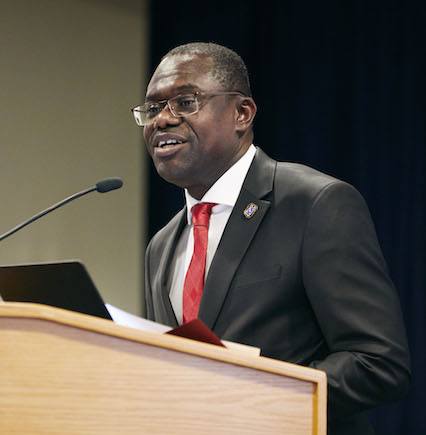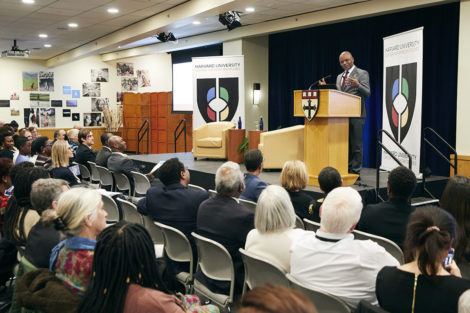March 12, 2020 – Africa faces a range of public health challenges, from infectious diseases such as cholera, malaria, Ebola, HIV, and more recently, coronavirus, to a growing burden of chronic diseases. Other problems in Africa, including poverty, armed conflicts, and government mismanagement, complicate efforts to address health issues.
But the founding director of the three-year-old Africa Centres for Disease Control and Prevention (Africa CDC), John Nkengasong, says African nations are making a concerted effort to develop a continent-wide strategy for improving public health.
Nkengasong, who formerly served in leadership roles at the U.S. Centers for Disease Control and Prevention’s Center for Global Health and the International Laboratory Branch of the Division of Global HIV and TB, spoke on March 5, 2020 at Harvard T.H. Chan School of Public Health’s inaugural Joseph S. Agyepong Distinguished Lecture on Public Health in Africa.

Agyepong, founder and executive chairman of the Ghana-based Jospong Group of Companies, spoke at the event and explained how his interest in public health led him to endow the lecture series. Harvard Chan School Dean Michelle Williams and Emmanuel Akyeampong, Oppenheimer Faculty Director for the Center for African Studies, offered opening remarks. Eugene Richardson, assistant professor of global health and social medicine at Harvard Medical School and a Brigham and Women’s Hospital physician, moderated a Q&A with Nkengasong after his presentation.
Nkengasong said that the Africa CDC’s overall goals are to improve disease surveillance, emergency preparedness and response, laboratory systems and networks, information systems, and national public health institutions.
He described some specific challenges, such as controlling Ebola. The virus used to crop up only in remote areas, but recent outbreaks in cities in West Africa “took us two years to beat back,” he said. Progress has been made in improving maternal and child health, but more needs to be done. And obesity in Africa is on the rise.
One important way to improve public health across Africa is to increase local manufacturing of medications and diagnostics, Nkengasong said. At present, Africa relies heavily on drugs imported from countries such as China and India, but locally manufactured drugs could cost far less. As for diagnostics, he said they’re badly needed for endemic diseases such as malaria, tuberculosis, and HIV.
Africa also needs to significantly boost its public health workforce, according to Nkengasong. For example, there are only 1,400 epidemiologists for the entire continent, but 6,000 are needed.
The Africa CDC has been spearheading numerous continent-wide meetings and trainings for public health professionals, Nkengasong said. In late February, to address the growing threat of coronavirus, the agency helped convene an emergency meeting for dozens of ministers of health from across Africa, and created a coronavirus task force to support member states with surveillance, clinical care and management, infection prevention and control, supply chain management, laboratory work, and risk communications.
“In December or January, if we’d been hit in Africa [with the coronavirus], we wouldn’t have had one single laboratory that was able to diagnose it,” he said. The Africa CDC kicked into action, organizing two massive training sessions for public health workers from across Africa. “As of today, we have more than 40 countries that have the ability to detect the virus,” he said. “Hopefully by the middle of this month, all countries will have the ability to detect it.”
He said the coronavirus response shows the power of “unity of purpose” in Africa—the ability of Africans “to come together rapidly … and act to solve a problem.”
photos: Kent Dayton
